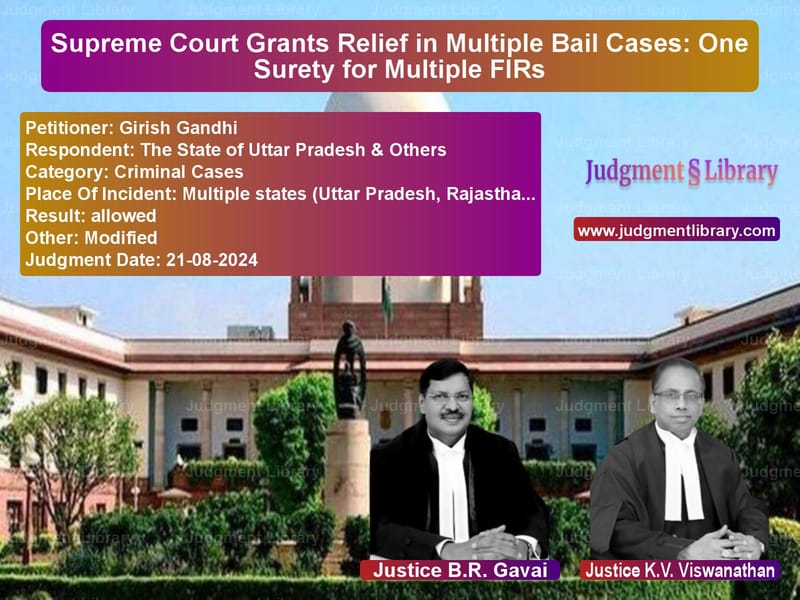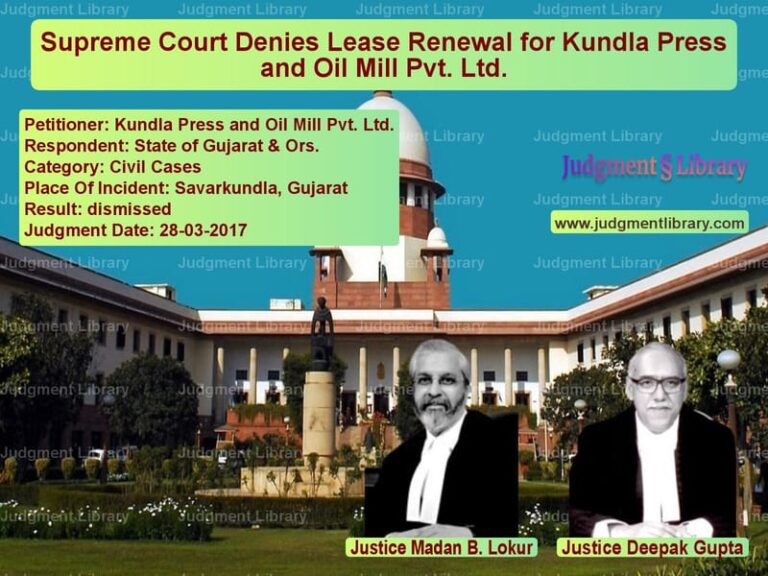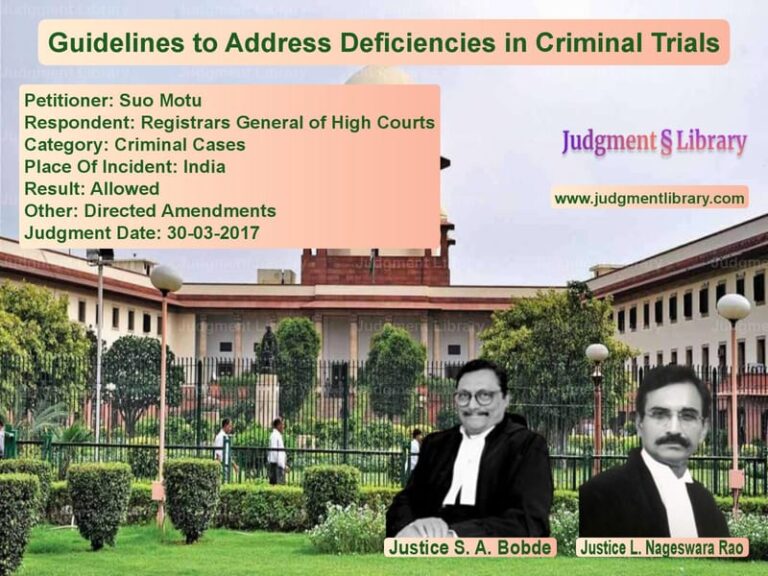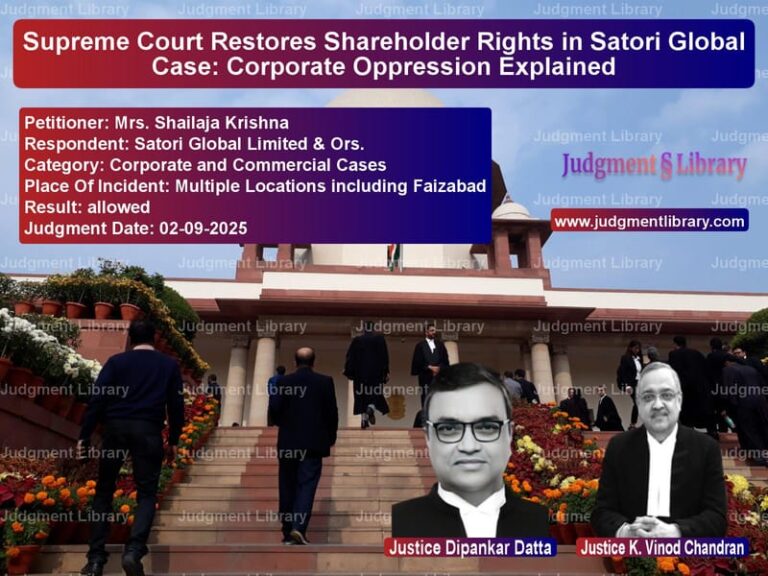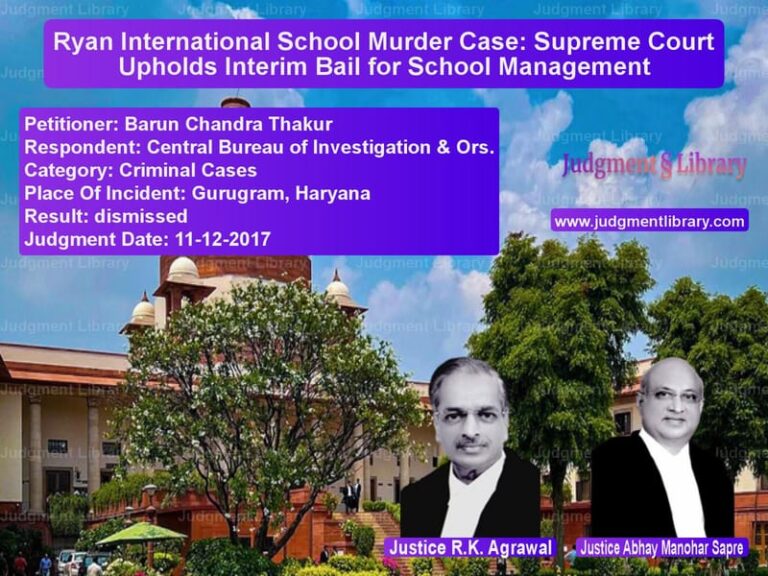Supreme Court Grants Relief in Multiple Bail Cases: One Surety for Multiple FIRs
The Supreme Court of India has delivered a crucial ruling in Girish Gandhi vs. The State of Uttar Pradesh & Others, granting relief to an accused facing multiple bail orders across different states. The Court allowed a single set of sureties to apply for multiple FIRs, preventing the undue hardship of furnishing separate sureties in each case. The decision ensures that accused individuals who have secured bail are not kept in prolonged custody due to technical difficulties in securing multiple sureties.
The Court’s ruling, which modifies the bail conditions in eleven cases across Uttar Pradesh, Rajasthan, Punjab, and Uttarakhand, highlights the importance of balancing procedural requirements with fundamental rights under Article 21 of the Constitution.
Background of the Case
The case arose from multiple criminal proceedings against Girish Gandhi, who was accused of financial fraud in various states. The key facts are:
- The petitioner was associated with White Blue Retail Pvt. Ltd., a company that entered into franchise agreements for setting up grocery stores.
- Multiple FIRs were registered against him for alleged financial misconduct, including failure to return security deposits and non-payment of commissions.
- He was charged under Sections 406, 420, 506, 467, 468, and 471 of the Indian Penal Code (IPC).
- The petitioner secured bail in 13 different cases across states but remained in custody due to the inability to provide separate sureties for each case.
- He approached the Supreme Court, arguing that a single set of sureties should suffice for all cases.
Legal Issues Considered
The Supreme Court examined the following key legal questions:
- Can a single personal bond and set of sureties apply to multiple FIRs?
- Should procedural bail conditions be relaxed when an accused has already secured bail in multiple cases?
- How should the principle of proportionality under Article 21 be applied to bail conditions?
Arguments by the Petitioner (Girish Gandhi)
The petitioner, represented by Advocate Prem Prakash, contended:
- He had already furnished bail bonds in some cases, including FIR No. 0030/2021 in Gurugram.
- Despite securing bail in 11 other cases, he remained in custody because he could not furnish multiple sureties.
- He was the sole breadwinner of his family and could not afford to meet the stringent bail conditions.
- The requirement of separate sureties was excessive, contrary to the principles laid down in Satender Kumar Antil vs. CBI (2022).
Arguments by the Respondents (State Governments)
The states of Uttar Pradesh, Haryana, Punjab, Rajasthan, and Uttarakhand opposed the petition, arguing:
- Each FIR represents a distinct case, and separate sureties are required to ensure compliance.
- A surety in one state cannot be held liable for proceedings in another jurisdiction.
- The bail orders did not specify that a common surety could be used for multiple cases.
- Allowing a single set of sureties might set a precedent that weakens the enforcement of bail conditions.
Supreme Court’s Observations
1. Bail Conditions Must Be Proportionate
The Court ruled that procedural bail conditions should not create unnecessary hardship:
“Granting bail but making its execution impossible due to stringent surety conditions defeats the very purpose of judicial relief.”
2. Common Sureties for Multiple Cases
The Court emphasized that requiring separate sureties in multiple cases causes undue delay:
“A person who has been granted bail should not be indefinitely detained due to procedural roadblocks. A single personal bond and common sureties can suffice where the allegations arise from the same set of transactions.”
3. Constitutional Protection Under Article 21
The Court reiterated the fundamental right to liberty:
“Article 21 guarantees the right to life and personal liberty, which must not be curtailed due to technical constraints in fulfilling bail conditions.”
Final Judgment
The Supreme Court ruled:
- The petitioner may furnish a single personal bond of Rs. 50,000/- and two sureties of Rs. 30,000/- each for all FIRs in Uttar Pradesh.
- A similar arrangement is permitted for cases in Rajasthan, Punjab, and Uttarakhand.
- The same sureties will stand valid for all cases, ensuring uniform compliance.
- The condition requiring a local surety in Rajasthan is waived.
- The petitioner must comply with all other bail conditions imposed by respective courts.
Implications of the Judgment
This ruling has significant implications for bail jurisprudence:
- Prevents Unnecessary Detention: Ensures that procedural hurdles do not keep accused persons in custody indefinitely.
- Standardizes Bail Conditions: Establishes that a single set of sureties may be sufficient for multiple cases.
- Strengthens Judicial Oversight: Reinforces the role of the Supreme Court in ensuring fair and reasonable bail practices.
- Sets a Precedent for Future Cases: Encourages courts to adopt a more pragmatic approach to bail execution.
The Supreme Court’s decision in Girish Gandhi vs. The State of Uttar Pradesh & Others is a landmark ruling that simplifies the execution of bail orders and upholds the fundamental right to personal liberty.
Petitioner Name: Girish Gandhi.Respondent Name: The State of Uttar Pradesh & Others.Judgment By: Justice B.R. Gavai, Justice K.V. Viswanathan.Place Of Incident: Multiple states (Uttar Pradesh, Rajasthan, Punjab, Uttarakhand, Haryana, Kerala).Judgment Date: 21-08-2024.
Don’t miss out on the full details! Download the complete judgment in PDF format below and gain valuable insights instantly!
Download Judgment: girish-gandhi-vs-the-state-of-uttar-p-supreme-court-of-india-judgment-dated-21-08-2024.pdf
Directly Download Judgment: Directly download this Judgment
See all petitions in Bail and Anticipatory Bail
See all petitions in Fraud and Forgery
See all petitions in Public Interest Litigation
See all petitions in Judgment by B R Gavai
See all petitions in Judgment by K.V. Viswanathan
See all petitions in allowed
See all petitions in Modified
See all petitions in supreme court of India judgments August 2024
See all petitions in 2024 judgments
See all posts in Criminal Cases Category
See all allowed petitions in Criminal Cases Category
See all Dismissed petitions in Criminal Cases Category
See all partially allowed petitions in Criminal Cases Category

